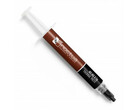Thermal paste is an oft ignored but important part of the equation in ensuring good cooling performance. While most users are content with whatever stock paste comes with their CPU or cooler, enthusiasts prefer ones with high conductivity like the Thermal Grizzly Kryonaut, ProlimaTech PK-3, or the Arctic MX-5 to name a few.
The aforementioned thermal pastes can get quite expensive, but cheaper alternatives might be available right in your kitchen should an urgent need arise.
A ComputerBase.de forum member going by the name AssassinWarlord posted a review of various thermal compounds tested on an AMD Radeon R7 240 GPU. For those not aware, the Radeon R7 240 was a US$69 entry-level GCN 1.0 card that launched in October 2013. The 28 nm Oland GPU ran at a base clock of 730 MHz and could boost up to 780 MHz. It featured 320 shading cores, 128-bit 900 MHz 2 GB DDR3 VRAM, and ran at a 30 W TDP.
Alongside several well-known thermal compounds including the Arctic TP3 thermal pad, Arctic MX-4, Alphacool Apex, Corsair TM30, the OP also used copper tape, thin cheese slice, thin potato, ketchup, toothpaste, and Penaten cream. The Radeon R7 270 was stress tested with FurMark at 1280 x 720 without AA for five minutes.
According to the OP, the R7 240 ran at 780 MHz at 1.15 V (unthrottled) before throttling to 730 MHz at 1.05 V (throttle level 1), 400 MHz at 1.05 V (throttle level 2), and finally to 300 MHz at 1.05 V (throttle level 3).
The 30 W TDP means that the card can actually be passively cooled although it starts to throttle or even shut off once core temperatures hit the 105 °C mark. That being said, the low TDP provides a good opportunity to see how unknown materials can help with temperature reduction and prevent throttling.
The Arctic MX-4 emerged as the overall winner recording just 49 °C temperature during the stress test. The interesting part was that ketchup wasn't a bad performer after all, resulting in 71 °C while the Sensodyne Sensitive toothpaste went up to 90 °C.
Others like copper paste, Penaten skin cream, and cheese led to core temperatures of 105 °C, which resulted in the R7 240 thermal throttling.
Overall, AssasinWarlord's experiment is a nice proof-of-concept that shows readily available household edible items can also serve as temporary thermal compounds in the event of an emergency. It remains to be seen if this can be scaled up to modern, higher wattage GPUs and CPUs.
In any case, we would recommend always having enough stock of a proper thermal compound if you are into frequent component swapping as there's always the danger of water content in edible items damaging electronic components.














